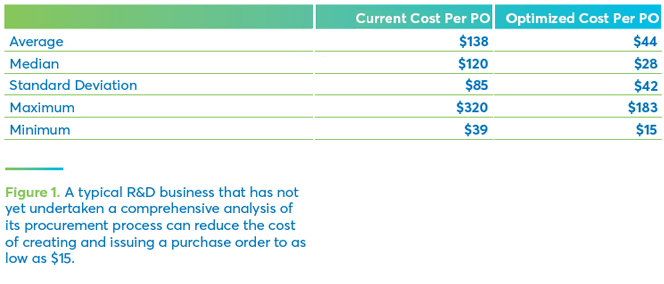Study Shows Potential to Reduce High R&D Purchase Order Costs
Challenge
You shop around for the best price on supplies to keep expenses minimal, but did you know you could be counteracting your efforts simply through your purchasing methods? Avantor Services recently assessed the current-state procurement processes at 16 unique companies using Lean Six Sigma methodology, including activity-based costing and value stream analyses, and found that the average cost to create and issue a PO in the R&D industry is $138. This high cost is typically caused by:
- Sourcing the same item from multiple suppliers
- Maintaining numerous low-volume suppliers, which drives up process complexity and operational costs
- Using a paper-based purchasing cycle
- Entering information into multiple systems for requisitioning, order placement, and receiving
- Unnecessary order reviews and approvals
- Not fully realizing the benefits of preferred provider agreements
So what can you do to lower your PO costs?
Solution
The critical first step toward optimizing your cost per PO is to conduct a Lean business assessment and obtain a quantitative understanding of the opportunities available. Avantor Services can perform such an assessment to rapidly evaluate business process, identify opportunities to reduce costs, and recapture time for your company’s scientists to focus on high-value, specialized work.

Result
Optimized future states were process-modeled for each company to show how a Lean procurements strategy can eliminate non-value added activities, maintain quality and control of the procurement process, improve end-user satisfaction, and reduce the cost per PO to as low as $15.
The greatest savings are seen when an R&D business consolidates suppliers and implements an electronic, automated ordering system. VWR’s e-Business Integration Services support a Lean procurement strategy by streamlining and automating purchasing activities, leading to improved cost control and productivity

Figure 2. Degree of cost per PO reduction opportunity identified on a case-by-case basis for 16 R&D businesses. As shown above, 11 of the 16 companies participating in this study could reduce the cost per PO by 50% or more.